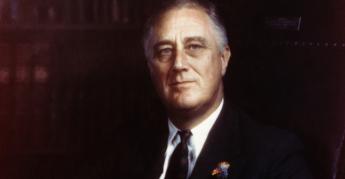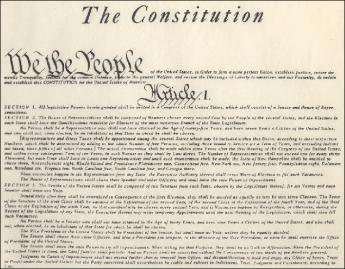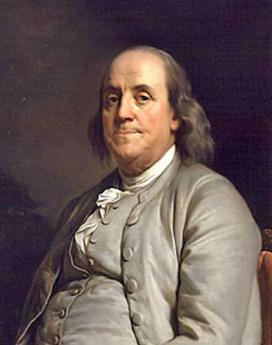Related Topics
Philadelphia Politics
Originally, politics had to do with the Proprietors, then the immigrants, then the King of England, then the establishment of the nation. Philadelphia first perfected the big-city political machine, which centers on bulk payments from utilities to the boss politician rather than small graft payments to individual office holders. More efficient that way.
Philadelphia Legal Scene
The American legal profession grew up in this town, creating institutions and traditions that set the style for everyone else. Boston, New York and Washington have lots of influential lawyers, but Philadelphia shapes the legal profession.
Shaping the Constitution in Philadelphia
After Independence, the weakness of the Federal government dismayed a band of ardent patriots, so under Washington's leadership a stronger Constitution was written. Almost immediately, comrades discovered they had wanted the same thing for different reasons, so during the formative period they struggled to reshape future directions . Moving the Capitol from Philadelphia to the Potomac proved curiously central to all this.
Unwritten Constitutional Modification
It is so difficult to amend the Constitution, we mostly don't do it. Our system is to have the Supreme Court migrate slowly through several small adjustments, watching the country respond. Occasionally we have imported new principles, sometimes not entirely wise ones, adopted without the same seasoning.
Unwritten Constitution

|
| Franklin Roosevelt |
After Franklin Roosevelt was elected to the Presidency four times, the 80th Congress reacted by proposing what is now the Twenty-second Amendment of the Constitution, that two terms are all that will be permitted in the future. The supporters of Roosevelt have continued to argue that the Amendment was a mean-spirited insult to a man who was no longer able to defend himself. In their view, the Amendment implies that Roosevelt wished to be a dictator, in the pattern of most dictators from Julius Caesar or even earlier. That would seem an unfairness to a man who apparently had sufficient popularity to be re-elected for as many decades as he lived. Dictators, by contrast, characteristically have a succession problem leading them to believe realistically a bloodbath might ensue in the aftermath of relaxation of iron rule during a transition. That is indeed the usual case; if there were nothing more to it, this Amendment would not have much justification. That is not all there is to it.
It might well be said that George Washington started an unwritten rule by voluntarily stepping down after two terms since he too could have been re-elected as many times as he pleased. Furthermore, political parties as we know them had not then been invented, so he could not have been motivated by the reasons I now wish to explore. He apparently just felt in his bones that a limited period was best, and the nation came to agree with his opinion. Ulysses Grant and Theodore Roosevelt both seem to have toyed with the idea of longer presidency but retreated in the face of public hostility. Just why the public felt that way is not clear; much was said about Washington's wise words, but that seems unconvincing.
-->As the country has grown in size, the man we elect to leadership is mainly elected for symbolizing the attitudes of the network of acquaintances he brings along to power. What we know as political parties only partly represent that power network. It is composed of those who seek an agenda that is not currently being addressed, plus those who oppose the agenda that is being pursued. When the combined numbers become a majority, the incumbents are replaced, and the cycle then goes on to repeat itself indefinitely. In that sense, the terms of office state a minimum. It is disruptive to replace governance too soon and too often. The Constitution is silent on the other side of it, of how long is too long, probably because there were no useful models to follow in this first democracy of modern times. We have to surmise that Washington reflected on this question for a period of time before he announced his answer with his own example. Eight years is long enough.
Washington surely had ample opportunity to observe the gradual assumption of power by the network of people who actually carried out public policy, to the point where they bitterly resist the loss of their power which is inevitably the consequence of losing their leader. He may have lost his taste for glory but they have not. Indeed, when you can see signs of their rebellion, you know it is time for the whole lot, to go. It is really pretty hard to see the frail, sick, disabled Roosevelt hungering for more power; it was his cronies who did. That he could be persuaded to make the effort is as good as a sign as you can find, that it was well past time for him to retire.

|
| Article Constitution |
We live in an age of aphorisms, called bites of sound. The argument might well be reduced to saying that since power corrupts, there does come a time to throw the rascals out. When the new reforming heroes take over, power will similarly corrupt them in time, so we must throw them out, in turn. It's a system we sort of eased our way into, and after a while, we came to feel that eight years is about long enough to get your reforms reformed, not quite long enough for corruption to become entrenched. And after two hundred years, we finally got around to making it official. Instead of talking about plumbing inspectors taking bribes, or lobbyists paying for Vicuna coats, or drunken congressmen cavorting in fountains with women of light repute, let's go right to the central figure in the controversy, the man who was indispensable even when he was uremic. The example has to do with patent protection, deemed important enough to write into the third Article of the Constitution, even though term limits were left vague.

|
| Benjamin Franklin |
Franklin Roosevelt hated monopoly, as do most of the rest of us. He carried this antipathy to the point of opposition to all patent protection for inventions, which Benjamin Franklin felt promoted innovation, but which FDR saw as creating a monopoly. Both tradition and the Third Article stood in the way of his doing much about it, at least overtly. However, he did control the appointment of federal judges, who controlled the enforcement of patents. We are told that all judicial nominees were interviewed privately on their views about patents, and one by one the judiciary was filled with patent-hating judges. Roosevelt, as mentioned, was elected four times, and it reached the point where it was effectively impossible to enforce any patent. The Eighth Judicial Circuit in Minneapolis did not sustain a single patent until 1969 since Roosevelt appointees continued on the bench long after new presidents, even new political parties, had come and gone. Regardless of how we may feel about trial lawyers and Bleak House lawyers, and litigation -- and even ridiculous assertions of patent protection for the human genome or patents for business methods -- the state of patent protection is most readily demonstrated by the number of patent lawyers. In 1950, there were only ten patent lawyers in Philadelphia, 4000 in the whole country. In 2007, there are four thousand patent lawyers in Philadelphia and over a million nationwide. Whether the instinct is to see this as a good thing or a bad thing, it is certainly proof that the Constitutionally protected right of patent protection was snuffed out by a process entirely contrary to Constitutional intent. And that process, whether saintly or utterly corrupt, was only made possible by flouting the traditional limitation on terms of office.
Originally published: Tuesday, December 11, 2007; most-recently modified: Monday, July 22, 2019